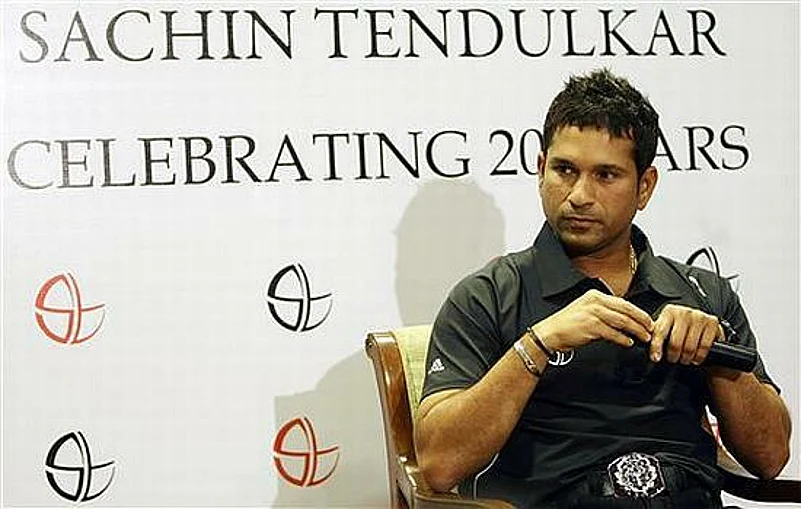Sachin Tendulkar, man in black, seemed like lamb to slaughter on Friday afternoon.
Tendulkar first played for India 20 years ago - on November 15, 1989. Big round figures, preferably divisible by 5, make all of deliriously happy, and Tendulkar is happy, and he knows he'll make a lot of people happy by simply chatting with them.
That's the reason that the media interaction that was supposed to be cozy to intimate has turned chaotic and noisy; Tendulkar didn't have the heart to turn away mediapersons who simply dropped in when they heard that the big man was going to chat. "He said he just cannot turn people away, certainly not today," says an anxious Sangeeta Kuriakos, managing the event for World Sports Group.
Tendulkar wore black - black jeans, black shirt, shiny black shoes which more informed viewers thought were Italian. He wore a black belt with a big, flashy silver buckle that sported what seemed to look like a skull.
The media, as always and like everyone, wants a piece of him, and Tendulkar knows it's part of the deal. He went through the inquisition with immeasurable, saint-like patience. He was asked the same questions ten times by different reporters, and by different TV crews. We grew to feel sorry for him. He spoke for hours, and, it seemed, with eagerness - it seemed that he didn't want to cause anyone to be disappointed that he wasn't candid or excited in the "exclusive" chat with his or her news organisation. It seemed he was trying to ensure that everyone went away happy, trying to ensure that everyone got something exclusive, even if it was just a tiny bit of information, emotion or even gesture.
Some of us sat through many of the interviews. I heard Tendulkar talk about his first Test innings about 10 times. "I felt was totally out of place," the master said exclusively, 10 times to 10 reporters separately.
Advertisement
Another 10 times, with passion drawn from I don't know where, Tendulkar said: "I got some great advice, you know. The general feeling was that I was playing too many shots."
"I was told that I had to work hard, hang in, for the first 15 minutes, and things would change," Tendulkar said with a twinkle in his eye each time.
Coffee was brought in, tea was brought in, water was brought in. Tendulkar looked at his watch, looked at the harried looking journalists who were in for a word or two from the bosses for not getting an exclusive. Maybe he knew what folks might feel after waiting for hours going away without him telling them his story exclusively. Tendulkar stood up, stretched his legs, walked about the small hall, and then he sat down, saying: "All right, let's do it."
He tried and managed to make everyone he talked with feel special. (To illustrate that everyone has a special ability, he told me, "I can't write like you"; though I wouldn't be surprised if he could write well too if he wanted and tried.)
So, what was the turning point in his career?
As I wearily walked out of the room, feeling sorry for the great little man, I heard him say with warmth and even thrill: "My innings of 58 or 59 odd in the second Test. I'd decided that I was not going to go off the park. I was going to fight it out..."
And so the story went, and so the master went on as the evening went.




















